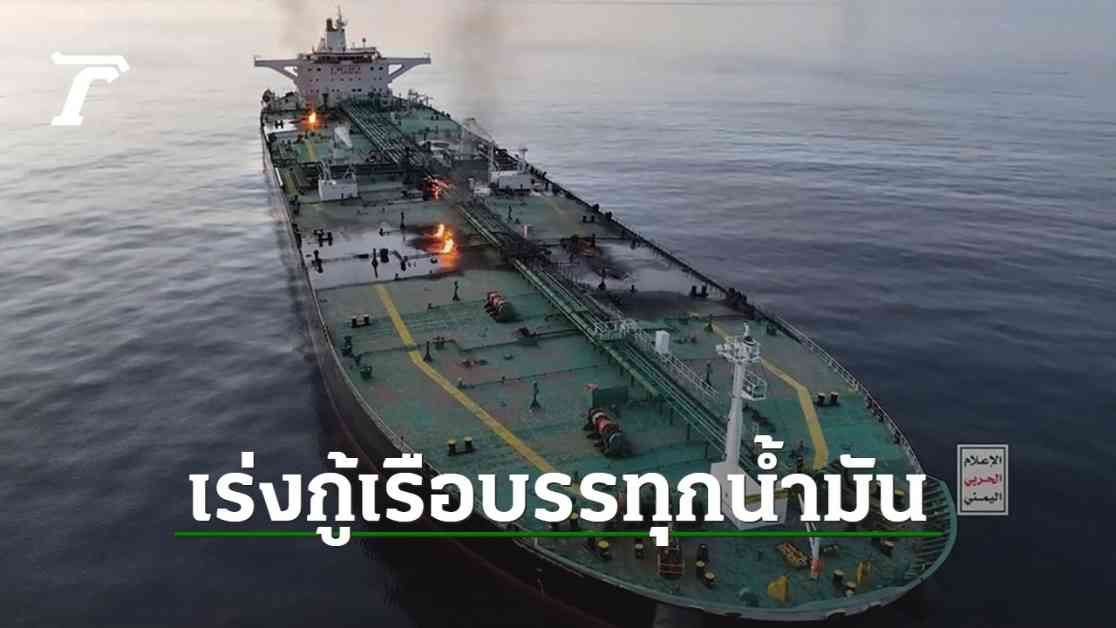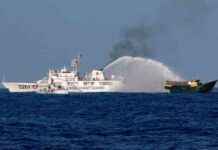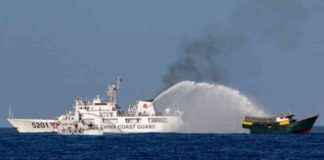Maritime Security Concerns in the Red Sea: Thai Navy Intensifies Efforts to Rescue Oil Rig
The Thai Navy has been on high alert in the Red Sea following a series of attacks on oil rigs by rebel groups. The latest incident involved the MV Sounion, a Greek oil tanker, which was left adrift in the Red Sea after being attacked by Yemeni rebels on August 21. The vessel, carrying over 1 million barrels of oil, sustained heavy damage in the attack, forcing its 25 crew members to evacuate. European naval ships have been assisting in the rescue operations, with private security personnel under the protection of the European Union’s military mission also involved in the efforts.
The urgency of the situation stems from the risk of the massive oil spill that could occur if the vessel’s cargo leaks into the Red Sea. The rebels’ attack resulted in a fire breaking out on the ship, which has been burning uncontrollably since then. This incident is part of a larger trend of rebel groups targeting ships passing through the Red Sea, particularly those with ties to Israel, in support of Houthi rebels in Yemen. The attacks escalated after the conflict in Gaza intensified on October 7, 2016, with a focus on Israeli-affiliated vessels to show solidarity with Hamas in Gaza.
The environmental impact of a potential oil spill from the MV Sounion is a major concern, with the rebels being accused of reckless and indiscriminate actions. The European military mission confirmed that rescue operations are underway, but the exact whereabouts of the salvage vessel heading towards the MV Sounion remain uncertain. On Monday, European troops stationed in the Middle East revealed that the ship’s upper deck was still ablaze in multiple locations, but no visible signs of oil leakage were detected.
Recent Attacks on Oil Tankers in the Red Sea
In the past few days, rebel groups have launched attacks on several oil tankers traveling through the Red Sea. On Monday, two vessels, the Blue Lagoon I from Panama and the MV Amjad from Saudi Arabia, carrying a combined total of over 2 million barrels of oil, were targeted by insurgents using small arms and drones. Fortunately, both ships sustained minimal damage and were able to continue their journey to their respective destinations.
The attacks on these oil tankers highlight the growing security concerns in the Red Sea region, with rebel groups becoming increasingly bold in their actions. The Thai Navy has been working closely with international partners to ensure the safety of maritime traffic in the area and to prevent further incidents from occurring. The recent spate of attacks has raised alarm bells within the international community, with calls for increased patrols and security measures in the Red Sea to safeguard vital shipping lanes.
Efforts to Safeguard Maritime Security in the Red Sea
In response to the escalating threats in the Red Sea, the Thai Navy has ramped up its efforts to protect oil rigs and vessels in the region. Patrols have been increased, and surveillance has been enhanced to detect any suspicious activities in the area. The Navy has also been conducting joint exercises with international partners to improve coordination and response times in the event of an emergency.
The European military mission has been actively involved in providing support and assistance to oil tankers under attack in the Red Sea. Their presence has been crucial in ensuring the safe passage of vessels through the region and in responding to security threats effectively. The collaborative efforts of the Thai Navy and international partners have been instrumental in maintaining maritime security in the Red Sea and preventing further attacks on oil rigs and tankers.
Challenges and Future Outlook
Despite the efforts of the Thai Navy and international partners, challenges remain in ensuring the security of oil rigs and vessels in the Red Sea. The unpredictable nature of rebel attacks and the vast expanse of the sea present significant obstacles to maintaining maritime security in the region. Continued vigilance and cooperation among all stakeholders are essential to address these challenges and protect vital shipping lanes in the Red Sea.
Looking ahead, it is imperative for countries in the region to work together to strengthen maritime security measures and combat threats posed by rebel groups. Enhanced intelligence-sharing, joint patrols, and coordinated responses to security incidents are crucial in safeguarding the Red Sea and ensuring the safe passage of oil tankers and vessels. By working together and remaining vigilant, the international community can effectively mitigate the risks associated with maritime security in the Red Sea and protect vital maritime infrastructure from security threats.




















